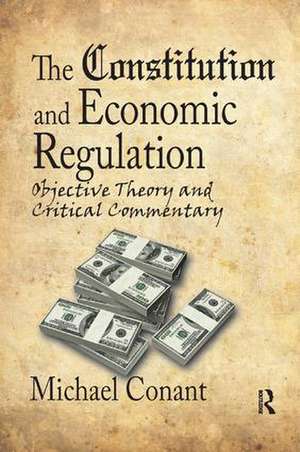The Constitution and Economic Regulation: Commerce Clause and the Fourteenth Amendment
Autor Michael Conanten Limba Engleză Paperback – 15 noi 2017
Economic policy for the nation was vested in Congress. To the extent that special interests could buy congressional favor for their anticompetitive activities, free markets were impaired within constraints as interpreted by the court. These decisions have been criticized for their failure to incorporate the antimonopoly tradition in the Ninth Amendment and their failure to recognize equal protection of laws incorporated into the Fifth Amendment. Conant holds that statutory controls of the economy are justifiable in economic theory if they are designed to remedy market failures and thereby increase efficiency. If statutes are passed to interfere with markets and create market inefficiencies for the benefit of special interest groups, they should be condemned under the standards of normative microeconomics. There are four main classes of market failure: monopoly, externalities, public goods, and informational asymmetry. This masterful analysis examines all four reasons for market failure in depth.
Litigation costs are analogous to transaction costs. If legal principles and rules are clearly and precisely defined by the Supreme Court when they are first appealed, litigation and its costs should be minimized. Conant claims that if legal principles or rules are uncertain because they lack definable standards, the number of legal actions filed and litigation costs will be much greater. This promotes additional litigation challenging the many statutes enacted to remedy asserted market failures in an expanding industrial economy. This work brilliantly addresses the danger to the economy in court rulings seeking to legislate standards of reasonableness.
Preț: 299.52 lei
Preț vechi: 364.17 lei
-18% Nou
Puncte Express: 449
Preț estimativ în valută:
57.32€ • 62.24$ • 48.15£
57.32€ • 62.24$ • 48.15£
Carte tipărită la comandă
Livrare economică 22 aprilie-06 mai
Preluare comenzi: 021 569.72.76
Specificații
ISBN-13: 9781138515628
ISBN-10: 1138515620
Pagini: 324
Dimensiuni: 152 x 229 x 23 mm
Greutate: 0.45 kg
Ediția:1
Editura: Taylor & Francis
Colecția Routledge
Locul publicării:Oxford, United Kingdom
ISBN-10: 1138515620
Pagini: 324
Dimensiuni: 152 x 229 x 23 mm
Greutate: 0.45 kg
Ediția:1
Editura: Taylor & Francis
Colecția Routledge
Locul publicării:Oxford, United Kingdom
Cuprins
1: Constitutional Structure and Functions; 2: Objective Theory of Interpretation: Textual Analysis in Social Context; 3: Judicial Review of Legislation: Scope and Limits; 4: Commerce Clause: Textual Meaning and Judicial Misconstruction; 5: Commerce Clause: Federalism and the Regulation of State Transactions; 6: The Commerce Clause and the Law Merchant: Law of Nations; 7: Constitutional Privileges and Immunities: The Ninth Amendment and the Antimonopoly Tradition; 8: Procedural Essence of Due Process: Judicial Error of Substantive Scope; 9: Injunctions against Labor Unions: Antitrust and Due Process; 10: Equal Protection Clause: Rights of Persons and Firms
Descriere
This study uses basic economic analysis as a technique to comment critically on the original meaning and the interpretation of those clauses of the Constitution that have particular bearing on the economy
